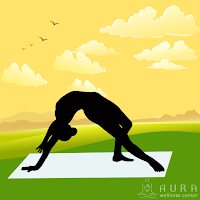By: Virginia Iversen M.Ed.
The holiday season is
replete with many different festive celebrations, including Hanukkah, the
Winter Solstice, Christmas, Kwanzaa, and New Year’s Eve. If you are currently teaching
Yoga classes during this busy season of the year, you probably have noticed
that many of your students are feeling quite stressed out about all of the personal
errands they need to accomplish, before the annual holiday celebrations begin.
Although this time of year can be quite exuberant and uplifting, it can also
add to your students’ stress levels because of the additional responsibilities
they may have to manage, including giving gift, preparing holiday meals and
attending various social engagements.
By offering Holiday Yoga
Classes that are geared towards relieving stress, you will support your
students in maintaining a state of clarity and equipoise amidst all of the
activity. There are a number of ways to creatively sequence your Yoga classes,
so that the stress relieving benefits of this ancient practice are enhanced.
For example, you may want to include calming and soothing breathing exercises
into your classes. You may also want to teach a slower-paced vinyasa class,
than you would normally teach to a multilevel group of students. Another
effective way to increase the stress relieving benefits of your Yoga classes is
to include a dedicated period of meditation into the practice, either at the
beginning of class or at the end of class.
If you set aside a
dedicated period of 5 to 10 minutes during your Yoga classes to guide your
students through a meditation practice that is focused on creating internal
spaciousness, the stress relieving benefits of the practice will be substantially
increased. When your students experience the internal spaciousness of their own
beings, their minds will begin to quiet and their levels of stress and tension
will naturally begin to dissolve. Ultimately, the simple act of knowing how to
withdraw their senses from the external world and rest their minds on the
internal spaciousness within will serve them in their lives, both on and off
the Yoga mat.
Meditation on
Spaciousness
This meditation practice
that is geared towards creating a sense of internal spaciousness, is most
effectively practiced after engaging in a balanced series of Yoga postures and
breathing exercises. The physical postures of Yoga help to release stress and
tension, which is frequently held in the large muscle groups in the body. By
guiding your students through a comprehensive practice of asanas and pranayama
exercises, before engaging in this meditation practice on spaciousness, your
students will be able too much more easily drop into a state of equipoise and
simply “being,” or in Buddhist terminology, calm abiding.
When you are ready to lead
your students through a meditation on spaciousness, ask them to come to a
comfortable seated position on their Yoga mats. If any of your students have
very tight hips and need some additional support, encourage them to place one
or two folded blankets underneath them for support. You may want to begin the
meditation practice by reading a brief passage from a spiritual or scriptural
text, poem or uplifting contemplation. This will serve as a transition from the
more physically active portion of your class, into the quiet, contemplative
part of the practice.
At the beginning of any
meditation practice, it is usually helpful to take a few minutes to practice a
soothing pranayama exercise, such as the Relaxation Breath or Alternate Nostril
Breathing. Nadi Shodhana Pranayama, or Alternate Nostril Breathing, is
especially helpful for balancing out the right and left hemispheres of the
brain. During this busy time of the year, many of us experience dominance in
the left hemisphere of the brain, where day-to-day planning is most pronounced.
By practicing Alternate Nostril Breathing for 3 minutes with your Yoga students
before meditating, your students will be much more able to slide seamlessly into
a thoughtless state of spaciousness within the field of their own
consciousness.
Virginia Iversen, M.Ed,
has been practicing and studying the art of Yoga for over twenty years. She
lives in Woodstock, New York, where she works as a writer and an academic
support specialist. She is currently accepting Yoga and health-related writing
orders and may be contacted at: enchantress108@gmail.com.
© Copyright 2015 –Virginia
Iversen / Aura Wellness Center – Publications Division
Please feel free to share
our posts with your friends, colleagues, and favorite social media networks.







